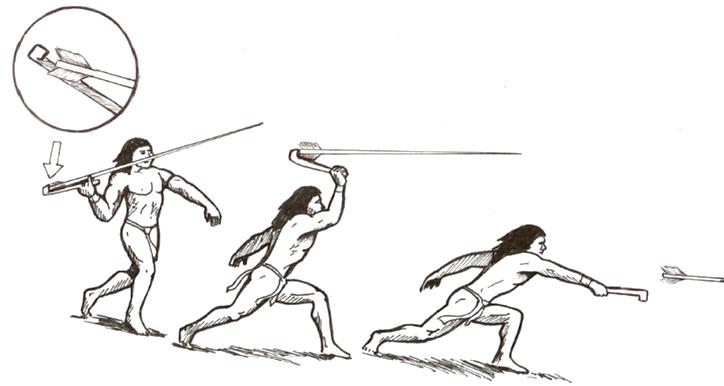An atlatl, also known as a spear-thrower, must have seemed magical to our ancestors. Just by using another stick in a certain way, they could throw a spear or dart much faster and further than they could before. Here’s an illustration from “Comidas dos nativos do Novo Mundo,” by Messias S. Cavalcante:

Of course, it’s not magic. It uses the physical principal of a lever, and you can use math to figure out how a certain kind of lever can help you throw a certain kind of stick further.
Like many of you, I use the latest generation of AI quite a bit. GitHub CoPilot (and before that, Amazon Q Developer) helps me produce more code, and faster, than ever before. In my new job, there’s a lot I’ve needed to learn. Claude is a daily go-to for learning new concepts, understanding new tools, and finding new ways of looking at problems. Finally, our company uses Reclaim to help manage our calendars across timezones on multiple continents.
These tools all feel like spear-throwers at the moment: They extend my capabilities in ever-growing ways. But they ultimately depend on me to initiate an action. The code may almost write itself, but the tools that make that possible still depend on my prompting and approval. Arguably, Reclaim points to a new model of independent agents. It will adjust my calendar automatically based on my to-do list, for example. It’ll add travel time and buffer time between meetings in intelligent ways. It has agency.
And this is the point at which we’re not sure what’s going to happen next. To return to the atlatl analogy, it’s one thing to throw a spear faster and further. It’s another to tell a magic stick (or other object) to make sure your family and tribe are fed, and then watch it independently hunt and gather for you.
I’m not entirely sure what my job will look like as these tools gain more agency. One answer is that I become more of a manager, a director of “weird interns” who let me take on more projects, and more ambitious ones at that. That sounds attractive. Alternatively, we’re as close to artificial general intelligence (AGI) as the experts think we are. In that case, it would be possible to replace me entirely in a few years.
At that point it’s a purely economic question: If an employee can be replaced by an AI agent, it comes down to which one is cheaper. We haven’t completely resolved the issue of when and how AGI will come into being, and how much computing power it would take. So it may still turn out that someone like me is a bargain compared to a software substitute. This may be true for a few years, or a few decades.
But nothing lasts forever. Most of us stopped using spears to catch dinner a long time ago. Human-written software may seem like atlatls a hundred years from now.